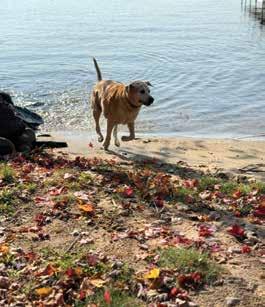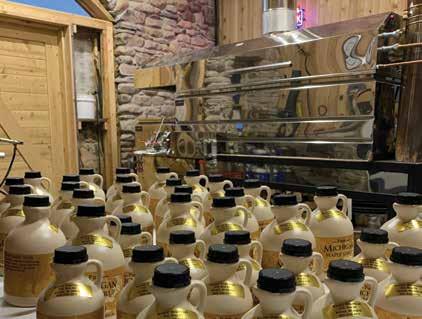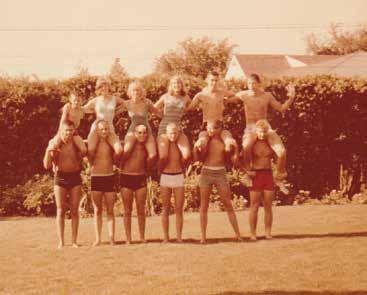
New Clean Energy Laws Update
18 is
Lineworker Appreciation Day
Sweet Legacy
MEDALS
Enduring
of
Olympics Athletes COUNTRY LINES March/April 2024 MICHIGAN
County
Electrification Association
Michigan’s
April
National
A
BEYOND
The
Spirit
Michigan’s Special
Ontonagon
Rural
You don’t have to lower the thermostat to control your heating bills. WaterFurnace geothermal systems use the clean, renewable energy in your own backyard to provide savings of up to 70% on heating, cooling and hot water. And because WaterFurnace units don’t use any fossil fuels or combustion, the EPA calls it the most environmentally friendly and cost-effective way to condition our homes.2 Contact your local WaterFurnace dealer to learn how WaterFurnace is good for the environment, your budget and the feeling in your toes.
YOUR LOCAL WATERFURNACE DEALERS

Allendale
Allendale Htg & Clg (800)327-1937
allendaleheating.com
Berrien Springs
Waterfurnace Michiana (269)473-5667
gogreenmichgeo thermal.com
Big Rapids
Stratz Htg & Clg, Inc. (231)796-3717
stratzgeocomfort.com
Clifford
Orton Refrig & Htg (989)761-7691
sanduskygeothermal.com
Filion/Bad Axe
Air-O-Dynamic Htg. & Clg. (989)582-0137
Hart Adams Htg & Clg (231)873-2665
adamsheating cooling.com

Indian River M&M Plmb & Htg (231)238-7201
mm-plumbing.com
Lansing Candor Mechanical (517) 920-0890
candormechanical.com
Lowell Arctic Inc. Htg. & Clg. (616)897-4213
heatingcoolingonline.com
Manistique Hoholik Enterprises (906)341-5065 hoholikenterprises.com
Marinette, WI GPS Htg. & Clg (715)732-2111
gpsheatingcooling.com
Michigan Center
Comfort 1/Air Serv of Southern Michigan (517)764-1500
airserv.com/southernmichigan/
Mt Pleasant Walton Htg & Clg (989)772-4822
waltonheating.com
Muskegon
Adams Htg & Clg (231)873-2665 adamsheatingcooling.com
Negaunee J-Goods Plmb. & Htg. (906)869-2522
jgoodsplumbingand heating.com
Portland ESI Htg & Clg (517)647-6906 esiheating.com
Sunfield
Mark Woodman Plmb & Htg (517)886-1138 mwphonline.com
Traverse City D&W Mechanical (231)941-1251 dwmechanical.com
Geofurnace Htg & Clg (231)943-1000 geofurnace.com
Alger Delta Electric: up to $2,000
Cherryland Electric: up to $2,500
Cloverland: up to $6,275
Great Lakes Energy: up to $5,000
Homeworks/Tri-County Electric: up to $4,750
Presque Isle Electric & Gas Co-op: up to $4,750
Thumb Electric: up to $2,000
CO-OP REBATE INCENTIVES
WATERFURNACE UNITS QUALIFY FOR A 30% FEDERAL TAX CREDIT 1 visit us at waterfurnace.com WaterFurnace is a registered trademark of WaterFurnace International, Inc. 1. 30% through 2032, 26% through 2033 and 22% through 2034 2. EPA study “Space Conditioning, The Next Frontier” (Report 430-R-93-004)


Michigan’s Electric Cooperatives
EXECUTIVE EDITOR: Casey Clark
EDITOR: Christine Dorr
GRAPHIC DESIGNER: Karreen Bird
RECIPE EDITOR: Christin Russman
COPY EDITOR: Yvette Pecha
CONTRIBUTING EDITOR:
Emily Haines Lloyd
PUBLISHER: Michigan Electric Cooperative Association
Michigan Country Lines, USPS-591-710, is published monthly, except August and December, with periodicals postage paid at Lansing, Mich., and additional offices. It is the official publication of the Michigan Electric Cooperative Association, 201 Townsend St., Suite 900, Lansing, MI 48933.
Subscriptions are authorized for members of Alger Delta, Cherryland, Great Lakes, HomeWorks Tri-County, Midwest Energy & Communications, Ontonagon, Presque Isle, and Thumb electric cooperatives by their boards of directors.
Postmaster: Send all UAA to CFS.
Association Officers: Tom Sobeck, Presque Isle Electric & Gas Co-op, chairman; Gabe Schneider, Cherryland Electric Cooperative, vice chairman; Chris O’Neill, HomeWorks TriCounty Cooperative, secretary-treasurer; Craig Borr, president and CEO.
CONTACT US/LETTERS TO EDITOR:
Michigan Country Lines 201 Townsend St., Suite 900 Lansing, MI 48933 248-534-7358 editor@countrylines.com
CHANGE OF ADDRESS: Please notify your electric cooperative. See page 4 for contact information.
The appearance of advertising does not constitute an endorsement of the products or services advertised.

6

10 14

6
A SOLEFUL MISSION
Travis Snyder takes steps to highlight veterans’ mental health.
10
MI CO-OP KITCHEN
Soups & Stews: Dish out a steaming bowl of comfort food.
14 BEYOND MEDALS
The enduring spirit of Michigan’s Special Olympics Athletes.
18 GUEST COLUMN
Old Friends: A Midwest Energy & Communications member rhapsodizes about the value of lifelong friendships.
MI Co-op Community
To enter contests, submit reader content & more, visit countrylines.com/community
Recipe Contest
See details on page 10. Tacos & Margaritas due April 1 and Homemade Burgers due May 1. Win a $100 bill credit!
Guest Column
Share your fondest memories and stories. Win $200 for stories published. Visit countrylines.com/community to submit. Win $200 for stories published!
Mystery Photo
See details on page 18. Win a $100 bill credit!
Contents March 2024 Vol. 44, No. 3 /michigancountrylines /michigancountrylines countrylines.com
3 MICHIGAN COUNTRY LINES

ontonagon.coop
/OntonagonCountyREA
500 J.K. Paul Street
Ontonagon, MI 49953
906-884-4151
800-562-7128
After hours: 866-639-6098
OFFICERS & DIRECTORS
William Hodges, President Lake Linden District 906-934-3743 • mistermich52@gmail.com
Calvin Koski, Vice President Aura District
906-524-6988 • cgkoski@up.net
Mildred Ann Gasperich, Secretary Boston District 906-337-5079 • anngasperich@yahoo.com
Randy Myhren, Treasurer Green/Firesteel/Toivola District 906-884-4092
Jack Lehto, Director Pelkie/Herman/Aura District 906-353-6684 • jlehto@up.net
Michael Urbis, Director
Ewen/Trout Creek/Lake Mine District 906-988-2344 • mdurbis@yahoo.com
Michael Gaunt, Director Chassell/Keweenaw Bay District 906-370-8133 • budget2019@gmail.com
PERSONNEL
Eugene Soumis, General Manager
Dallas Aho, Administrative Assistant
Fay Hauswirth, Billing Clerk Mark Urbis, Line Superintendent
OTHER INFORMATION
Date of Incorporation: Sept. 30, 1937
Fiscal year-end: Dec. 31 countrylines.com/coops/ontonagon
Ontonagon County REA is an equal opportunity provider and employer.

MNavigating a Momentous Shift in Energy Policy: Michigan’s New Clean Energy Laws
Eugene Soumis, General Manager
ichigan’s energy future is undergoing a significant transformation with the recent signing of a comprehensive set of bills by Gov. Gretchen Whitmer. Collaborating closely with the Michigan Electric Cooperative Association (MECA), Ontonagon REA will delve into an in-depth analysis of these newly enacted laws in the months ahead. Below is a brief overview focusing on two key bills that hold substantial implications for Michigan’s electric cooperatives and another bill that may impact our members locally.
100% Clean Energy by 2040
Michigan’s new 100% clean energy by 2040 target stands among the most ambitious in the country. It will require all state electric utilities to employ a portfolio of 100% carbonfree resources by 2040. Clean energy is largely defined as wind, solar, hydro, and nuclear.
This legislation mandates utilities to procure 50% of their energy from renewables by 2030, escalating to 60% by 2035—a substantial leap considering the Great Lakes State currently stands at 15%. Starting in 2035, the renewable portfolio standard transitions to a clean energy standard, requiring all utilities to obtain 100% of their energy from noncarbon-emitting sources by 2040.
This bill is a “big lift” for Michigan. Utility and business community concerns remain regarding the pace of decarbonization and its impact on electric reliability and affordability. While Michigan’s electric cooperatives support investments in clean energy, we must also consider the operational realities of relying on intermittent resources. Constructing large-scale
projects demands considerable time and financial resources, as well as overcoming time-consuming regulatory hurdles, which makes the proposed timeline a challenge for many of the state’s electric utilities. Additionally, the challenge of land acquisition looms, with an estimated need for approximately 200,000+ additional acres for wind and solar power generation to achieve the renewable energy targets in the legislation.
Energy Waste Reduction Requirement for Electric Co-ops
This bill mandates that electric co-op boards approve Energy Waste Reduction plans and programs. Co-ops are now obligated under statute to submit a formalized waste reduction plan to the Michigan Public Service Commission (MPSC) every four years.
Renewable Energy Siting
This bill gives state regulators authority over renewable energy permits. While it doesn’t directly impact cooperatives, it empowers the MPSC to issue permits for solar systems exceeding 50 megawatts and wind systems over 100 megawatts. Formerly, localities held exclusive control over siting. The new laws centralize permitting for large projects at the state level, while smaller solar projects remain under local authority.
“This energy package will have more consequences for the state of Michigan than any energy legislation in Michigan’s history” said Craig Borr, President and CEO, Michigan Electric Cooperative Association. “It will clearly take time for the impacts to be felt by Michigan residents, but the impacts will be felt for decades.”
4 MARCH 2024

April 18 is National Lineworker Appreciation Day
merica’s electric cooperatives have designated April 18 as National Lineworker Appreciation Day. At Ontonagon REA, members of our distribution department are the “first responders“ of our electric system. On April 18, we make a special point of honoring them for the services they perform, around the clock and in dangerous conditions, to keep power flowing and protect the public’s safety. When an outage call comes in, they leave their families, whether it’s dinnertime, a weekend, or a holiday, to find and fix the problem. They work hard to keep the power flowing through our communities and are the backbone of every power system.
AOntonagon REA would like to recognize members of the distribution department and thank them for their dedication and service. Members of the department are as follows:
Ontonagon Line Crew: Kaleb Preiss, Kelly Clark, Justin Sironen
Hancock Line Crew: Nels Erickson, Brady Erickson, Luke Jouppe
L’Anse Line Crew: Gill Martinez, David Brown
Tree Trimming Crew: John Myllylahti, Adam Hawkins, Matt Urbis, Scott Anderson
Statement Of Nondiscrimination
In accordance with Federal civil rights law and U.S. Department of Agriculture (USDA) civil rights regulations and policies, the USDA, its Agencies, offices, and employees, and institutions participating in or administering USDA programs are prohibited from discriminating based on race, color, national origin, religion, sex, gender identity (including gender expression), sexual orientation, disability, age, marital status, family/parental status, income derived from a public assistance program, political beliefs, or reprisal or retaliation for prior civil rights activity, in any program or activity conducted or funded by USDA (not all bases apply to all programs). Remedies and complaint filing deadlines vary by program or incident. Persons with disabilities who require alternative means of communication for program information (e.g., Braille, large print, audiotape, American Sign Language, etc.) should contact the responsible Agency or USDA’s TARGET Center at (202) 720-2600 (voice and TTY) or contact USDA through the Federal Relay Service at (800) 877-8339. Additionally, program information may be made available in languages other than English. To file a program discrimination complaint, complete the USDA Program Discrimination Complaint Form, AD-3027, found online at http://www. ascr.usda.gov/complaint_filing_cust.html and at any USDA office, or write a letter addressed to USDA and provide in the letter all of the information requested in the form. To request a copy of the complaint form, call (866) 632-9992. Submit your completed form or letter to USDA by:
1. mail: U.S. Department of Agriculture Office of the Assistant Secretary for Civil Rights, 1400 Independence Ave., SW, Washington, D.C. 20250-9410;
2. fax: (202) 690-7442; or
3. email: program.intake@usda.gov. This institution is an equal opportunity provider.
Employment Opportunities
The Ontonagon County REA invites applications for the positions of billing clerk and operations manager.
Billing Clerk: The billing clerk reports to the general manager and is responsible for providing friendly service to members, particularly as it relates to bill payment and the provision of services offered by the cooperative. Must provide accurate and timely data entry, data processing, and computer operations. Must also collect, interpret, and analyze consumer account information and effectively communicate the data and results to consumers and others as necessary or required. Position is a permanent, full-time, nonexempt (union) position.
Operations Manager: The operations manager reports to the general manager and is responsible for directing the construction and operations, and maintenance functions of the cooperative’s distribution system in such a manner as to assure safety, reliability, and quality of service. This includes managing resources, including line crews and tree trimmers, to maintain a high degree of proficiency and responsiveness while controlling costs.
Ontonagon County REA offers a comprehensive benefit package, including health, vision, dental, and life insurance, along with a defined benefit pension plan through NRECA. Benefits also include paid sick leave, vacation, and 11 paid holidays.
For further information on either of these employment opportunities and detailed job requirements, please visit ontonagon.coop/ employment.php
Resumes may be sent to:
Ontonagon County REA –
Attn: CEO/General Manager
500 James K Paul Street, Ontonagon, MI 49953
5 MICHIGAN COUNTRY LINES
A Soleful Mission
Travis Snyder Takes Steps to Highlight Veterans’ Mental Health
By Emily Haines Lloyd

When Travis Snyder returned from his tour in Afghanistan as a U.S. Marine, he was both proud and relieved that everyone in his unit was brought home in one piece. It took time, as well as a pivotal and heartbreaking experience, to realize that maybe he and his unit actually didn’t come back all put together.
This was the beginning of a new journey for Snyder, one that took an unexpected path to a new purpose.
A Tour of Duty
When Snyder joined the Marines at 24, he was looking to make an impact, serve his country, and find both discipline and direction in his life.
When his unit was deployed in October of 2017, it worked in Security Forces with a mission to train, advise, and assist the Afghan army against the Taliban. “We saw it as a blessing,” said Snyder. “You go through this training in order to serve. Serve our country.

Serve a community and its people. It was a chance to do good.”
Eight months later, Snyder and his entire unit returned home—back to normal. However, it didn’t take long for Snyder to realize things weren’t exactly normal. He still wanted and needed purpose, but instead found depression and anxiety attacks. Snyder pushed through them, unsure when or if they would stop.
In August of 2019, one year after his tour, Snyder received a devastating phone call. A good friend from his unit, Geoff Hughes, had committed suicide.
Walking for Warriors
The loss of Geoff was an unthinkable blow. Snyder had a desire for direction when he joined the Marines. Now he was unsure what to do next. With feelings of being untethered and his grief and shock over Geoff, Snyder knew he needed to do something to change his course and make an impact like he had in the service. “I knew I had to do something. Something big,” said Snyder. “There are too many of my brothers and sisters in the service who feel like I did when I got home— aimless, disconnected.”
6 MARCH 2024

As a way to commemorate his friend and to shake up his own life, Snyder took a walk. A long walk. Around Lake Michigan.
A Mission of Miles
Snyder’s “walk” turned into an 810-mile journey around the whole of Lake Michigan. He’d started a Facebook page for some friends and family to keep track of his trek.
Snyder knew he wanted to make this trip about veterans and mental health, so he arranged stops along the way to connect with different organizations and bring awareness to their causes.
Snyder had packed his camping gear, expecting to spend most nights outdoors along the way. He never had a chance to unpack it. “The first night, a friend from the Marines called me and told me his parents lived along the way and were happy to let me sleep in their RV for the evening,” said Snyder. “Forty-two straight nights, people offered me a place to sleep. You look at social media thinking there’s so much that is bad, but if you really look around you, there are so many good people in the world.”
And speaking of social media, the five to 10 people he expected to follow him on Facebook turned into 14,000, with another 3,000 on Instagram. The word had gotten out about Snyder’s wild walk. People were tuning in to hear and learn more about veterans’ issues, particularly mental health.
Next Steps
Snyder put on his hiking shoes each year through 2023, including walking along the West Michigan lakeshore from New Buffalo to Mackinaw City, across the state, and around Lake Michigan again—totaling 2,590 miles and raising over $15,000 dollars for veteran organizations. “That first mile back in 2019 was to commemorate a friend,” said Snyder. “I may have taken those steps on my own, but what’s been accomplished has been through a community of caring people. It would not have been possible without them.”
A reminder that no one should walk alone in this life. And with the help of people like Travis Snyder, hopefully fewer of us will.
“I may have taken those steps on my own, but what’s been accomplished has been through a community of caring people. It would not have been possible without them.”


 /travishikeslakemi
/travishikeslakemi
/travishikeslakemi
/travishikeslakemi
7 MICHIGAN COUNTRY LINES










1 5 7 8 10 2 4 6 9 8 MARCH 2024
Pets 3

11 14



Enter to win a $50 energy bill credit!
Submit A Photo & Win A Bill Credit!
Ontonagon REA members whose photos we print in Michigan Country Lines during 2024 will be entered in a drawing. Four lucky members will win a credit of $50 on their December 2024 energy bills!
Upcoming Topics and Deadlines:
Flowers & Gardens due March 20 (May issue)
Monuments, Statues, Memorials, due May 20 (July/Aug. issue)
To submit photos, and for details and instructions, go to http://bit.ly/countrylines
We look forward to seeing your best photos!

13 16

1. Fritz the cat. Kathleen Harter
2. Together with our newest rabbits! Danielle Impola
3. Baxter enjoying his swim in the portage canal. Jaclyn Johnson
4. The Sherlock Holmes look, walking Huron Bay on chilly October morning! John Scramlin
5. Our cat Sterling… safely by the fire extinguisher. Laura Hamlett
6. Milano, Comet, and Slim Pickens (front to back) snuggle in a cat pile on a chilly winter day. Nathan Miller
7. Waiting for a treat. Connie Pentti
8. The young and the old. Ginny Johnson
9. Let’s ride! Lisa Rhodes
10. Our dog Venus taking in the first big snow of 2024. Tracie Conn
11. Boundless love, loyalty, life lessons, and adventures—Zeus. Holly Pelto
12. Ollie. Kristi Kangas
13. Big hug! Brenna Erickson
14. A dog’s smile is worth a thousand words! Kathleen Helppi
15. Seamus is a very active 3-year-old border collie who loves running, and catching balls and frisbees. Here is a rare still pic of him. Thomas Grimm
16. Moon and Luna chilling. Kendra Komoroski
PHOTO CONTEST
9 MICHIGAN COUNTRY LINES
12 15
SOUPS & STEWS
Dish Out a Steaming Bowl of Comfort Food.

Recipe Contest
Win a $100 energy bill credit!
Tacos & Margaritas due April 1; Homemade Burgers due May 1
Submit your favorite recipe for a chance to win a $100 bill credit and have your recipe featured in Country Lines with a photo and a video. Submit your recipe at micoopkitchen.com , or send it via email (include your full name and co-op) to recipes@countrylines.com
WINNING RECIPE!
GARLIC, TORTELLINI, SPINACH & TOMATO SOUP
Kathleen Atwater, Cherryland Electric
2 tablespoons butter
6–8 cloves garlic, minced
½ cup chopped onion
6 cups reduced-sodium chicken broth
9 ounces fresh or frozen cheese tortellini
1 (14.5-ounce) can diced tomatoes, undrained
10 ounces spinach, washed and coarsely chopped
1 tablespoon fresh oregano, chopped
1 egg
½ cup grated Parmesan cheese
¼ teaspoon salt
¹⁄ 8 teaspoon black pepper
In a large saucepan, melt the butter over medium heat. Add the garlic and onion and sauté until fragrant, 2–3 minutes. Add the chicken broth; bring to a boil. Add the tortellini and cook halfway, about 5 minutes for frozen pasta, or 2–3 minutes if using fresh pasta. Add the can of tomatoes; reduce the heat to a simmer and cook just until the pasta is tender, about 4 minutes. Stir in the spinach and oregano and cook until wilted, 1–2 minutes. Meanwhile, whisk together the egg, Parmesan cheese, salt, and pepper. Drizzle into the soup and cook, stirring about 3 minutes more. Remove from heat and serve. Add additional salt and pepper, as desired. Makes about 6 servings.
MI CO-OP Recipes
Watch a video of this month’s winning recipe at micoopkitchen.com/recipe_ type/videos/ 10 MARCH 2024
BEEF STEW
Ralph Kridner, Great Lakes Energy
6 ounces bacon, chopped into ¼ -inch strips
2 pounds beef chuck, cut into 1-inch pieces
2½ teaspoons sea salt (or to taste), divided
1 teaspoon freshly ground black pepper, divided
¼ cup all-purpose flour
2 cups dry red wine, plus extra for deglazing
2 tablespoons balsamic vinegar
2 tablespoons olive oil
5 carrots, peeled and cut into ½ -inch pieces
1 medium yellow onion, diced
2 stalks celery, finely diced
6 garlic cloves, minced
2 tablespoons tomato paste
3–4 cups low-sodium beef broth
8 ounces red wine demi-glace sauce
2 bay leaves
2 tablespoons fresh thyme, minced
1 sprig fresh rosemary, finely chopped
1 pound small (fingerling) potatoes, halved or quartered
Preheat oven to 300 F. In a large, oven-proof pot, sauté bacon over medium heat until golden brown and fat is released. While bacon is cooking, place beef in a large mixing bowl and season with 1½ teaspoons salt and ½ teaspoon black pepper. Sprinkle beef with flour; toss to

combine and evenly coat beef. Transfer beef in batches into the hot bacon fat and cook over medium-high heat, until beef is browned (2–3 minutes per side). Add olive oil if needed. When the bacon in the pot is golden brown, remove it and put it in a large bowl. Transfer browned beef to the bowl with bacon. Add a bit of red wine to the pot to deglaze, then reduce the heat to lowmedium. Scrape the bottom of the pot with a wooden spoon to release meat pieces. Add balsamic vinegar and simmer over low-medium heat, about 10 minutes, being careful not to burn. Pour 2 cups red wine in with the beef and bacon. Heat 2 tablespoons olive oil in a large pot over medium heat. Add carrots, onion, celery, and garlic; sauté 10 minutes. Then add the tomato paste and sauté another 1–2 minutes. Then return the beef, bacon, and wine to the pot. Add beef broth, red wine demi-glace sauce, bay leaves, thyme, rosemary, and remaining 1 teaspoon salt and ½ teaspoon pepper. Stir until the demi-glace has melted. Then add potatoes and stir to combine everything, submerging the potatoes in liquid. Cover with lid and bake for 2 to 3 hours. To thicken, combine 2 tablespoons water and 1 tablespoon cornstarch. Mix well and add to stew. Stir well and heat for 5 minutes. Pour into bowls, add a sprinkle of salt, serve, and enjoy!

CREAM OF CAULIFLOWER AND CHICKEN SOUP
Nancy Hascall, Cherryland Electric
3 tablespoons olive oil
4 stalks celery, diced
1 small head cauliflower, chopped into small florets
1 large onion, diced
1 large carrot, diced
4 garlic cloves, minced
3 cups chicken broth (or more to reach desired consistency)
1 cup salsa
1 cup cooked, diced chicken
1 cup grated cheese of choice
1 cup half-and-half
VINNY’S SEAFOOD CHOWDER
Deb Finedell, Great Lakes Energy
2 slices bacon
1 yellow onion, diced
1 celery stalk, diced
3 medium potatoes, peeled and diced
¼ cup all-purpose flour
4 cups milk
1 cup firm white fish (cod, tilapia, halibut, etc.)
½ pound shrimp or any other seafood of choice
½ cup corn
½ teaspoon salt
½ teaspoon black pepper
1 tablespoon chopped fresh parsley, for garnish
Sauté bacon in a large soup pot over medium-high heat until crispy, 3–4 minutes. Remove bacon from pot and chop into small pieces. Drain all but 1 tablespoon bacon grease from the pot. Add diced onions and celery to the pot. Sauté over medium heat until soft, 3–4 minutes. Add potatoes and sauté 1–2 minutes. Reduce heat to low. Add the flour and stir, cooking until the flour is completely moistened. Add the milk and increase the heat to medium. Heat the soup until it is steaming, just before it starts to boil, stirring often. Continue cooking, uncovered, until the potatoes are nearly tender, 10–15 minutes. Reduce heat if milk begins to foam. When soup has thickened, add seafood, corn, and cooked bacon. Cook until fi sh is cooked through, 5–10 minutes. Add salt and pepper. Garnish with parsley.
Garnishing Options:
sour cream, Parmesan cheese, guacamole, fresh cilantro, crispy bacon
Heat the olive oil In a large kettle. Add the celery, cauliflower, onion, carrot and garlic; sauté for about fi ve minutes. Cover, turn the heat to low, and cook for another fi ve minutes or until vegetables are soft. Add the chicken broth, salsa, and cooked chicken. Blend with an immersion blender. Add the cheese and gently stir until the cheese is melted. Add the halfand-half and heat to desired temperature. Garnish each bowl with choice of sour cream, Parmesan, guacamole, cilantro, and cooked bacon. Enjoy!


A SWEE T LEGACY
By Yvonne Whitman
Growing up in Northland, every spring Rita Bruce would watch her grandfather and father tap maple trees and place tin cans under the spouts to catch the sap. She then observed them pouring the cans of watery sap into a rustic homemade evaporator and boiling it for hours to achieve the delicious final product: gallons of delicious pure maple syrup. Eventually, Rita and her brothers tapped the trees using an oldfashioned crank drill. “When I started, I wasn’t even sure which trees were maple, so I’m pretty sure I tapped a few poplars,” she says with a laugh. “But that’s how we learned.”
When she married her husband Gerald, he had never made maple syrup of his own, but he wanted to
learn, so Rita showed him the ropes. Rita and Gerald had eight children and the family tradition continued. “I took the babies with me. We would collect the sap in the evening and boil it during the day,” she recalls. They would make about 20 gallons of syrup per year in a rustic lean-to shack in the woods in Arnold, resulting in just enough syrup for family and friends. “One thing about making maple syrup is it’s so darned much work, but you really don’t think of it as work because it’s so much fun,” she said.
With Gerald’s passing in 2004, the annual “sap to syrup” ritual was passed to their son, Peter, and his wife, Hope, who lived nearby. “Gerald always said, ‘Be ready to collect on the first day of spring.’ This meant all trees
had to be tapped and ready to roll by the first day of spring, and that’s what we still do,” Hope says. “Then it lasts about two and a half weeks. When the sap is freely flowing, it’s possible to obtain three to four gallons of sap per day from each tree.”
And while the family tradition remains the same, the methodology has changed. Crank drills have been replaced with cordless electric drills and the taps are now sleek stainlesssteel spouts. Blue plastic bags are a marked improvement over makeshift tin can containers. “With the transparent sap sacks, we can see from a distance if the sap needs to be collected or not,” Hope says.
When the rustic original sugar shack started deteriorating, the Bruces decided that they needed to build a new one. “One with power and water,” Hope says with a laugh. So, in 2017, the Bruces began to build a new sugar shack within proximity to their home. Hope wanted it to match the logs and stone of their house. Peter not only accommodated her request but took it a few steps further.
“Things just seemed to line up,” he recalls. Right at the time he was constructing the building, American Transmission Company was changing the grade on some of their nearby transmission lines that were on the Bruces’ property. When they cut into a bluff, it exposed a small lode of natural limestone. Peter brought it home and used it in the construction of the sugar shack. The new sugar shack was completed in 2020, at which time they also purchased a brand-new evaporator to streamline the syrupmaking process.
They currently tap approximately 500 trees on 120 acres, walking from tree to tree and collecting sap in fivegallon pails and using a tractor and a 400-gallon milk tank to transport the sap to the shack. Hope maintains a “tap map” to show which trees were tapped each year. On a good day, they will fill the tank two or three times with raw sap. Once placed in the evaporator, it can take up to two days to produce the first batch of syrup.
12 MARCH 2024
“When spring breaks, we just have to make maple syrup. It’s in our blood.”
After that, a small batch is made every four to six hours. They produce 70 to 100 gallons of syrup a year that they then sell via word of mouth.
Syrup-making time has always been a friends and family event. “What I really enjoy is how many people show up to the sugar shack during syrup season. In the spring, people are looking for something to get out and do. So, they show up here and everyone starts collecting sap and having fun,” Hope says. “Sometimes we think, ‘How are we going to collect from 500 trees today?’ And then the next thing we know, there are carloads of people arriving to help us. We don’t call anyone. They just show up.”
They are creating more memories in the new sugar shack while still honoring their past. For instance, the wooden table in the shack is one that had belonged to Hope’s grandparents. Hope painstakingly restored it, and these days, family and friends gather around it after a day of collecting sap to enjoy food, friends, and family. “I start cooking and freezing meals like chili and soups in February to be able to feed all of the people who help us make syrup in March and April,” Hope explains.
And the passion for making syrup has transcended through the generations. Some of Peter’s siblings and a few close friends make it a point to come home to help. Peter thinks it is a way of sharing the joy Gerald had for making syrup. “Our kids call just about every day during syrup season to ask, ‘Is the sap running today?’ And a few of our nieces and nephews come to help as well,” Hope proudly says. As Rita concludes, “When spring breaks, we just have to make maple syrup. It’s in our blood.”



13 MICHIGAN COUNTRY LINES

BEYOND MEDALS
The Enduring Spirit of Michigan’s Special Olympics
Athletes
By Emily Haines Lloyd
n 2000, the former President of South Africa Nelson Mandela said: “Sport has the power to change the world. It has the power to inspire. It has the power to unite people in a way that little else does…Sport can create hope where once there was only despair…It laughs in the face of all types of discrimination.”
In Michigan, there are some amazing athletes who would surely agree with Mr. Mandela.
SOMETHING SPECIAL IN THE MAKING
Since 1968, when the first Special Olympics Games were held at Chicago’s Soldier Field, these athletes with intellectual disabilities have been a force of inspiration and support for one another. The goal was to put a bright—and very public—spotlight on ability, not disability. A delegation of athletes from Michigan attended those original games. The next year, Michigan’s first State Summer Games took place in Kalamazoo at Western Michigan University.
Fifty years later, more than 5 million athletes train and compete in more than 100,000 events each year, in 172 nations. The program has grown perhaps more than anyone could have anticipated and the impact is massive. Yet it still brings meaning to one athlete, one coach, and one family at a time.
A SPARK OF INTEREST
Max Hinga was just 8 years old when his curiosity was sparked at his elementary school in Portage, Michigan, by a friend who fi rst mentioned Special Olympics to him. Max then began his sports journey with softball. “I was the youngest and smallest player on an almost all-adult team,” said Max. “But I was ready to go and felt at home.”
From that point on, Max’s involvement became a life-altering experience, introducing him to lifelong friendships and instilling in him a sense of belonging. Max’s mother Gretchen Hinga became equally involved, as she noticed there were significantly more adult athletes than those her son’s age. “Within a year, I was recruiting younger athletes,” said Gretchen. “With more

14 MARCH 2024
athletes comes the need for more volunteers. So, I started recruiting for volunteers.”
In no time, the numbers grew, and Gretchen found herself as the local outreach coordinator. She now plays a pivotal role in managing, coordinating, and organizing various aspects of the games, from athlete physicals to volunteer applications and verifying coaching credentials.
NURTURING A COMMUNITY OF INCLUSION
Max’s dedication extends beyond the playing field; he has become a U.S. Youth Ambassador, amplifying the voices of those who often go unheard. “Not everyone can get up and speak to the whole world about change and inclusion,” said Max. “I traveled with my Unified Partner and my mentor, spoke about inclusion, and learned how to spread the word to others.”
For Gretchen, Special Olympics is more than just a series of events; it is a community that provided support and companionship while Max was growing up. Now, as a coordinator, she is dedicated to extending that sense of community to others. “Special Olympics is about so much more than just sports. It is one big family of support and encouragement,” said Gretchen. “It is a lifelong movement and is for anyone.” She encourages those who may not qualify as athletes to become volunteers, assuring them that the experience will be life-changing.
A TRIUMPH OF ABILITIES OVER DISABILITIES
The impact of the games can’t be easily measured, as passion, inclusion, and growth of the athletes, families, and volunteers have an ongoing ripple effect that goes well beyond the sporting arena. “Special Olympics challenged me to not only want to get my driver’s license, but show many people I can be a leader,”
said Max. “We (athletes) can get a job, get a degree, and be who we want to be. I’ve turned my disabilities into abilities.”
This smart and capable young man insists that no one should ever say they can’t do something. Our efforts can’t be measured in medals or applause. It is the effort, the courage, and the joy with which we apply ourselves that tells the world who we are.
As Eunice Kennedy Shriver, who helped establish Special Olympics, said at the first opening games: “Let me win. But if I cannot win, let me be brave in the attempt.”
FOR INFORMATION: somi.org
TO VOLUNTEER: somi.org/volunteer
TO DONATE: somi.org/waystogive

UNIFIED SPORTS & INCLUSION CENTER IN GRAND RAPIDS
For over 50 years, Special Olympics Michigan (SOMI) has sought to create a community of inclusion where every person is accepted and welcomed, regardless of ability or disability.

In 2019, the SOMI Board of Directors purchased the former South Christian High School building in Grand Rapids with the dream of turning this 127,000-square-foot facility on 17 acres into the largest Special Olympics training and sports center in the world.
With the official groundbreaking in November 2023, the complex will feature six soccer fields, 10 bocce courts, putting and chipping greens, and pickleball courts, as well as an eight-lane track and an artificial turf soccer and flag football field.
15 MICHIGAN COUNTRY LINES
Michigan Electric Co-ops Contribute Billions to State Economy, Says Latest Report
Arecent report titled “Economic Powerhouses: The Economic Impacts of America’s Electric Cooperatives” sheds light on the significant economic influence of electric cooperatives in the United States, with a specific focus on their contributions to job creation, income generation, and overall economic growth. This analysis underscores the pivotal role of electric cooperatives at both the national and state levels, with a closer look at the impact within Michigan.
The report reveals that these cooperatives have a substantial statewide impact, supporting approximately 7,388 jobs annually and contributing a remarkable $5.3 billion to Michigan’s Gross State Product (GSP).
“Our state’s electric cooperatives power 300,000 homes, businesses, and farms in 60 of the 83 counties across rural Michigan,” said MECA President Craig Borr. “Co-ops are a massive economic engine statewide, as well as in their local communities.”
Beyond these direct economic figures, there are broader implications. Electric cooperatives stimulate economic activity throughout their communities, fostering a ripple effect that extends to supply chains, suppliers, employee spending, and community engagement. Moreover, they play a crucial role in supporting long-term community success and making substantial investments in grid modernization, renewable energy, and broadband networks to serve rural members.
“It’s not just about numbers,” said Borr. “It’s about committing to make a positive impact in the communities that our cooperatives serve.”
The report emphasizes cooperatives’ pivotal role as economic engines in both local and state economies, highlighting their commitment to rural development and the overall economic vitality of the regions they serve. The findings show what those in the cooperative community have always known—there is nothing more impactful and powerful than a mission that focuses on people, not profits.
7,388
MICHIGAN JOBS ANNUALLY $2.7 B WAGES & SALARIES TOTAL IMPACT JOBS TAXES PAID LABOR INCOME IN MICHIGAN GROSS STATE PRODUCT (GSP) $5.3 B $1 B TAXES $413 M FEDERAL LOCAL $594 M 16 MARCH 2024

Five Ways to Save Energy in the Kitchen
Ah, the kitchen. It’s undeniably one of the most-loved rooms in our homes. It’s where we gather with family and friends for our favorite meals and memories. But like most of us, you probably aren’t thinking about saving energy when you’re planning that perfect dish. Here are four ways you can save energy in the kitchen with minimal effort.
Unplug appliances that draw phantom energy load. Plugged-in appliances continue to draw energy even when they’re not in use. Devices, small appliances, and chargers left plugged in year-round can add up in wasted energy costs. Unplug smaller appliances when they’re not in use, or better yet, use a power strip for convenient control.
Use your dishwasher efficiently. Only run full loads, and avoid using the “rinse hold” function on your machine for just a few dirty dishes; it uses three to seven gallons of hot water for each use. You can also save energy by letting your dishes air dry. If your dishwasher doesn’t have an automatic air-dry switch, turn it off after the final rinse and prop the door open so the dishes will dry faster.
When possible, cook with smaller appliances. Using smaller kitchen appliances, like slow cookers, toaster ovens, and convection ovens, is more energy-efficient than using your large stove or oven. According to the Department of Energy, a toaster or convection oven uses one-third to onehalf as much energy as a full-sized oven.
Help large appliances work less. Keep range-top burners clean from spills and fallen foods so they’ll reflect heat better. When it’s time to put leftovers in the refrigerator, make sure the food is covered and allow it to cool down first. That way, the fridge doesn’t have to work harder to cool warm food. Speaking of your fridge, keeping it full can help it stay at a consistent temperature. If you need more to fill it with, try using containers of cold water (or bags of ice for the freezer).
Use Energy Star-certified products. The blue Energy Star label tells you that a product is more energy efficient than a product without the label. For example, Energy Star-certified refrigerators tend to be around 9% more efficient than models that aren’t certified, while Energy Star-certified lightbulbs can use up to 90% less energy than normal incandescent bulbs, according to the Energy Star website. Shopping for Energy Star-certified products can save lots of energy in the long run, especially if you’re replacing older, non-certified appliances with newer certified ones.
1. 5.
2. 4.
17 MICHIGAN COUNTRY LINES
3.
Old Friends
By J. Joseph Mapes, a Midwest Energy & Communications member
It has been said that “old friends are the best friends.” I surely agree. Growing up in Grand Rapids, I began forming many friendships, beginning in kindergarten in 1950. In those days, we didn’t hang out with our parents much...we hung out with our friends. You could say we raised each other, as we were always together having fun.
Although I went to Culver Military Academy in high school, my GR friends kept in touch. I then moved to New Jersey and Florida for a few years. Several friends would visit me in Florida (imagine that), and one suggested that I transfer to Western Michigan University for my junior year, and sent the paperwork. I couldn’t wait to get back to Michigan and live off-campus with some of those same friends. We had the time of our lives!

During the late ‘60s/early ‘70s, most of us got married, raised children, and worked. Many moved out of state, making it difficult to get together. In 1981, however, one of the guys decided that enough was enough and started what we call “the boys’ weekend,” a time to reconnect and let loose. There were around 15 attendees that first year, many from out of state. Some years, an extra weekend was planned with the wives, who wanted to join in the fun. In 1993, we rented a cottage on Lake Michigan in South Haven, and we have been going there every September to this day. Unfortunately, we have lost a number of these dear friends over the years, but nine of us continue the tradition.
This May, we (and wives) are meeting in Grand Rapids to celebrate us all turning 80. We will take a bus tour of our childhood homes (16), then be dropped off at Roses for dinner. There is nothing like old friends, as we hold on to so many memories of good times together, while still making new memories!


About the Author: J. Joseph is a retired owner/manager of Bank Street Bingo Hall and Bank Street Winter Market in Kalamazoo.
His family’s history is interesting! The grandfather he was named after (Col. J. Joseph Reddy) was a medic and surgeon who was General Douglas MacArthur’s personal aide and physician in the Philippines in the 1930s.
Guest Column
Win $200 for stories published!
Share your fondest memories and stories. Win $200 for stories published. Visit countrylines.com/community to submit.
Where In Michigan Is This?
Identify the correct location of the photo to the left by March 20 and be entered into a drawing to win a $100 electric bill credit. Enter your guess at countrylines.com/community

January 2024 Winner! Our Mystery Photo winner is Eileen Gustafson, an Alger Delta member, who correctly identified the photo as the Benny the Beard Fisher art attraction at the Northland Outfitters Campground, Germfask, Michigan. Winners are announced in the following issues of Country Lines: January, March, May, July/August, September, and November/December.
MI CO-OP Guest Column
Photo Win a $100 energy bill credit!
Mystery
18 MARCH 2024

HOW DOES THE
• Attaches to your home’s existing heating system, it does not replace it.
• Delivers 90% on average of your home’s heating needs and 100% of your home’s cooling needs.
• If you have a well and are heating with propane, fuel oil, electric or wood, your current heating and cooling cost is likely greater than it would be to fully finance and heat & cool with a Well-Connect.
• Installs in one day, any time of year. No drilling or excavation is required.
SCAN HERE TO GET A FREE QUOTE Financing, 30% tax credit, and rebates up to $2,000 available. Geother mal Made Af for dable ENJOY YEAR-ROUND COMFORT HEAT FOR AS LOW AS $600 ALL WINTER COOL FOR AS LOW AS $50 ALL SUMMER Hyb d Geoth EXISTING FURNACE 50° WATER 38° WATER 95° AIR 70° AIR
SYSTEM
833-436-9355 wellconnectgeo.com
WORK?
REDUCE DEPENDENCY ON FUEL OIL, WOOD, OR PROPANE 70¢ PER GALLON OF PROPANE 70¢ PER GALLON OF PROPANE HEATING WITH WELL-CONNECT IS LIKE PAYING HEATING WITH WELL-CONNECT IS LIKE PAYING



Ontonagon County Rural Electrification Association ontonagon.coop /OntonagonCountyREA the Power Behind Your Power. Lineworker Appreciation Day | April 18, 2024
















 /travishikeslakemi
/travishikeslakemi
/travishikeslakemi
/travishikeslakemi



































